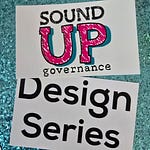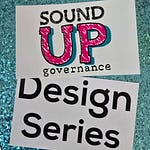TRANSCRIPT
Matt Voiceover
Welcome to a special mini episode of Sound-Up Governance. I'm in the middle of a travel whirlwind and trying to make sure I have cool stuff to share with you. So here's a chunk of my conversation with Eric Wetlaufer that didn't fit into the previous episode. If you haven't heard that one yet, please pause this now and go back to listen, it'll get you primed for Eric's vibe and perspectives. Here, we learn a little bit more about impact investing and about Eric's experience in an institutional investing environment during an era of significant emergence for environmental and social awareness in the institutional community. I mean, let's dive right in.
Matt
Define impact investing.
Eric Wetlaufer
Yeah. So this is another area, right? Where, you know, you just have to question what our industry does. And you have to question whether it makes sense for the client or not. And I always try to put the client, myself in the in the clients shoes. And doesn't make sense from from their standpoint. This is an incredibly lucrative business, the investment business, if it's done at scale, and done well. But it's not always in the best interest of the clients, the products are developed, etc. So we went through a period of time where, you know, I think it started more in Europe. Leadership around ESG, environmental, social, and governance concerns. The material risks that a business can be exposed to, through their different practices, their environmental footprint, or social footprint. And the Europeans were, you know, ahead of the North Americans, I think, in being sensitive to that, and recognizing that, if they are not investing in companies that are hurting the world, then maybe they're helping the world. If they have a broader, more holistic responsibility for the world that their retirees are retiring into, it's great if they have a great pension to spend. But if it's in a world that's, you know, sort of post apocalyptic, then, you know, what good is that? So, you know, I got involved more in the ESG space, thinking these non financial factors were important, and that we should consider those as part of our investment process. And this wave of ESG investing came along, and I was responsible here in Canada, at the pension plan that I worked for, for the sustainable investments team. And we were signatories to the PRI. We were founding signatories to the PRI, which is the United Nations backed Principles for Responsible Investing. And getting involved in that organization is sitting on the board of that organization, I really looked at our industry, and how many people were jumping on this bandwagon. But in word more than deed with so many people, right? They were relabeling what they were doing as ESG. Or they were making believe that sort of their process had always been ESG centered, they were always taking these things into consideration. And when you look under the hood, at what they own, you know, look at look at the top holdings. And it's companies like, you know, Coke and Pepsi that are producing sugar and plastic and trucking around water. And it's like, wait, that's not I think what people think they're getting. So from the clients' perspective, you're putting yourself in the client's shoes, what what does client really want? What do they value from an investment product? What should we deliver? It became apparent to me that it wasn't ESG, as ESG is being done at a lot of places. There's some great ESG. And so that's wonderful. But it's being it's being practiced poorly, practiced badly in a lot of places. And I learned more about impact investing, which is really about the products and the services and the positive impact that and the outcomes that the products and services of companies make when they are sold out to the out into the world. And that to me made a lot more sense. It resonated with me as much more of what the clients probably want when they're getting when they're getting their values associated with their investment dollars. These are people's hard earned savings, right? And they've earned they've worked hard, they want to invest, they want their values associated with those investments, similar to how they would buy, you know, free trade coffee or, or take an eco vacation, they want to make economic decisions that are more aligned with who they are and what their values are. And we as an investment or as investment industry really should think harder about meeting them where they are, as opposed to a lot of the ESG which is kind of just scoring companies; practices on water use...
Matt
All signal, no virtue.
Eric Wetlaufer
Yeah, exactly. Exactly. All signals no virtue. Exactly.
Matt
So I'm curious in this impact investing space. Is there room in there for... and I might be asking a deliberately naive question because I sincerely don't know, but how much room is there in this space for, let's go back to the Coke and Pepsi thing. For, let's say, using an investment in Coke and Pepsi to help them improve like an activist position kind of thing rather than just allocating our capital into, you know, companies that we believe in and not allocating it in companies we don't.
Eric Wetlaufer
I think there is room for that. 100%. The question is, is that what your clients want? Are you being transparent that that is your strategy, where we want to be, we want to take a most improved, greatest, greatest reduction of harm and greatest improvement in impact approach. And so we will find companies that are poor actors, and we will help them transition to become better actors. Either in a friendly way, or sometimes in a less than friendly way, through kicking out the bums on the board and putting new people in place, a more activist approach. You know, I think there's nothing wrong with short term activism, it's like, if your, if your relative is sick with, you know, something, and they need surgery, like, is there a problem that the surgery only takes two hours to, you know, between when they go in the room and come back out of the room? You know, "well, it's too short term!" I don't think there's a problem with that. Right? If that's the cure, then that's the cure, right? Sometimes these things go on for way too long. I think that's, that's fine. It's not our approach, but I have I have nothing against it. The question is, does what does the client want? Does the client sleep better at night, knowing that their dollars are going to improve companies that are not great behavors? Or are there is there a dollars...or are they gonna sleep better at night knowing that their dollars are in companies that are doing really great things already? Or would they like their dollars to be invested in both? Right? That's fine, too. You don't have to choose between? Either or
Matt
I like this, this distinction that you're making, and maybe I'm asking for an opinion more than what do you guys do kind of thing. Is, to what extent can you - and maybe should you if you feel like going there - or I don't even have to put you... to what extent should and can impact investing outfits help to bring their clients along? Instead of just hoping that their clients can articulate what they want clearly.
Eric Wetlaufer
Yeah. There's an education challenge that we have to demonstrate to people, to illustrate for people, what impact with their investment dollars can look like. It just doesn't exist. I think, you know, the investment industry does a poor job of illustrating just how regular financial products, return only products, work. We do a poor job of that. You know, we have these, you know, risk ribbons, where, you know, we sort of tried to do it, this is more risky fund, this is a less risky fund. And yeah, but we get people into things where it's like, "Don't worry, that's all AAA." And then what we realized in the financial crisis is that all the people writing things AAA were, were not doing the work. And they were, they were paid to label things AAA that really weren't. Right. And so we've done it, we have a poor track record, at educating people to the real features, the real characteristics, the real risks and attributes of financial products. You know, it is it is a challenge for us but I think as as we get bigger and better with impact, I think we'll have more stories to tell we'll get bigger broader audiences and and and we'll we'll make our way.
Matt
What do you guys do to cut through the noise of misinformed clickbait-y kind of stuff that will really attract the attention of investors, right.? And I don't mean just mean like, you know, Joe Blow on the street. I'm talking about, you know, I sometimes meet funds that have bought into stuff that's clearly like, "Wait, you're gonna buy that cryptocurrency?" And that's where you're at? Right? So to what extent do you guys have to work to kind of pay close attention to misinformation or anything similar to that?
Eric Wetlaufer
I don't have a good answer for that question. It's persistence, like the the logic argument, the coherent "that's clickbait. That's misinformation." Like I can't get on Twitter and counter stuff. I'm not even on Twitter. I don't want to engage in that conversation. I really want to provide product that not speaks for itself. I mean, I want to be out there promoting and marketing and telling our story and telling the story of impact investing. But yeah, I think I think I would just be an emotional mess if I tried to take on all the misinformation that's out there.
Matt
Yeah. And I suppose if I'm reading between the lines of what you're saying, I think I'm interpreting that - let's say you were getting pressure from clients to go down a road that was clearly misinformed - that what you're saying doesn't preclude you as a firm from being able to say, "Guys, let's, let's be a little bit cautious here, or there some things that you probably should know before we"
Eric Wetlaufer
Yeah, yeah.
Matt
Okay. So there's an there's an interesting aspect of your timeline professionally, that overlaps with an interesting aspect of my timeline professionally, which is you being involved in the Canadian institutional space at a really transformative time around the dialogue of boards and corporate governance and so on. And being at a very powerful institution in terms of potential influence on that and around the the narrative and around behavior, and around certainly around disclosure. I don't even know exactly what question I want to ask because I don't want to lead you too hard. But maybe you can just sort of tell me like in that stretch, when you were in the space, what are some of the things that changed that you thought mattered for better or for worse? And then I can kind of latch on to them?
Eric Wetlaufer
Yeah, I mean, I think when I first arrived in Canada, and and started at the pension plan, it was the pension fund, it was 2011. And I think most of the pension industry in Canada was focused on the G in ESG. It was, are we are we holding management accountable to good governance? Do we better define what good governance looks like through some of the places where we see really bad governance, and we want to, we want to really change things, right? So there are these events now where the this is so far out on the tail, that we have to step up and challenge this behavior, right, even though we may not own a ton of the stock. This is just, you know, we have, we have a role to play a leadership role to play in governance that we want to call this out. So when I, when I got into the role, it was really, that was the kind of activity in ESG that we were doing. There was some work on the environmental on the E side, where if we were making an investment in the natural resource play, we might, you know, fly out to some of their operations and really see whether what they said they were doing was what they were doing with respect to mitigating any environmental risks that might be apparent. So it was pretty nascent, right, as far as understanding the broader environmental risks that the overall fund might have, pretty nascent with respect to, you know, holding everybody to governance standards, not just the worst offenders. But, for example, we had we farmed money out to external managers, How are they doing their job with respect to their governance practices and how they vote proxies? Right? That's a that's a really interesting question. And can we, and we can get, can we get them to up their game with respect to holding, holding their investor their investments to the standards that we hold ours to? Right, so we can keep pressure them as big clients to do the same that we do? So there's that question. And then there's the whole, you know, the S in the ESG, which is the one that I think that's been the most challenging to make progress on. Because there's so you know, there's misinformation, there's pushback, there's, there's a lot of, you know, what does it look like?
Matt
It's very emotional.
Eric Wetlaufer
It's very emotional. So, you know, I think with respect to DEI, diversity, equity and inclusion. You know, I was very involved in these efforts at the firm that I was working at, for our own entity, for our own enterprise. It's one of the few places where I felt like, okay, you know, if you're having problems, you just push harder. Well, this is a space where you can push too hard. And but but you're not going to make any progress if you don't start pushing harder. So how hard is too hard? And where's the right, where's the right middle ground where you push hard enough that you're gonna make some progress, but you don't push so hard that there's backlash, and you sort of killed the whole effort? Right. So it's more difficult. It's more difficult. There's certainly places where it's easy, like human rights in the supply chain, like, that's cut and dried. Like we have to know it for companies that we invest in that they know that they've interrogated their supply chain. And they're they have audits and ways to find out whether human rights are being violated at the companies that are upstream in their supply chain that's cut and dried. Right. So there are places where it's easier,
Matt
No one will push back against that too hard.
Eric Wetlaufer
Exactly. But that doesn't mean that it's that you won't find problems. And there are there are certainly instances that are they're pretty disturbing in that in that space
Matt
Some some Canadian ones, at that..
Eric Wetlaufer
So I think by the time I left, which was seven years later, you know, we had beefed up that team, we probably tripled the size of the team, we really have had a commitment to understand the overall fund's environmental footprint, the carbon carbon footprint of the of the fund and all of its holdings and really make progress against sort of trying to manage that and improve that over time. So, it certainly had evolved quite a bit in that period of time. Yeah, there was there was a waking up.
Matt Voiceover
I'm so spoiled, right? What a privilege to have kind of lived and worked through the exact same period as Eric, interested in the same topics but sitting at completely different ends of the table. A table so big that neither of us even knew the other existed until much later. But his experience, through the eyes of an institutional investor, of the last dozen years or so of corporate governance and ESG stuff is a missing puzzle piece for me. A really useful one, at that, like one of those ones where you immediately know where four other pieces go, too. Thanks for listening to Sound-Up Governance and for permitting me a bit of a break. Let me know what's on your mind, share your travel itineraries or wax nostalgic about bygone eras in corporate governance by shooting me an email or voice memo at soundup@groundupgovernance.com. See you next time.














Share this post